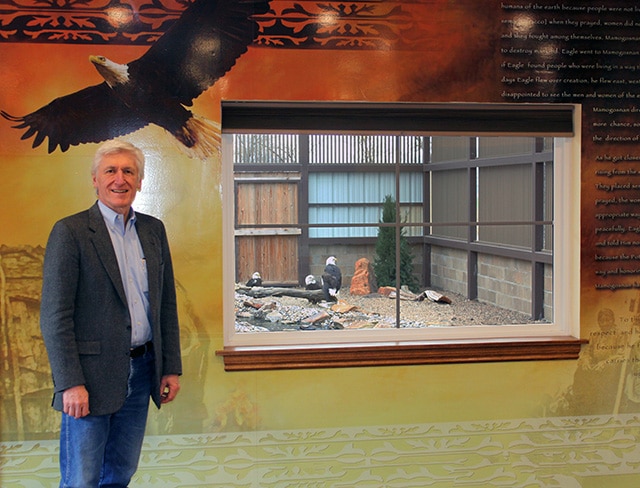
Nestled off of Hardesty Road and a half mile from the North Canadian River, the Citizen Potawatomi Nation aviary resembles a small farm house in the middle of a field of central Oklahoma short grass.
CPN members and sisters Jennifer Randell and Bree Dunham live on site and tend to the aviary’s other full time residents, eight bald eagles. Each bird is in varying states of recovery from injuries or neglect, though most are set to stay permanently, unable to support themselves in the wild.
“For us, it isn’t a job,” said Dunham. “We want to try and educate our members and reconnect our people with the living Eagle. Vice Chairman Capps was very worried about us having a life outside of the aviary, and we can get away when we want to. But right now, taking care of the eagles is all we want to do.”
The benefit of the aviary is obvious, as the birds’ rapidly improving conditions indicate a high quality of life. For the tribe, the easy availability of eagle feathers for spiritual and religious ceremonies has cut down on a process that takes months or years when going through the National Eagle Repository in Denver, Colorado. Each feather is naturally molted and are then collected by Randell and Dunham. The sisters clean them by freezing each feather twice, and then smoke them in the traditional Potawatomi medicines of tobacco, sage, and sweet grass. For the time being, eagle feather requests are exclusively for tribal members and are limited to five per order.
The significance of the eagle feather was not lost on a recent visit to the aviary by Vice Chairman Linda Capps and Supreme Court Justice Robert Coulter, who stopped by during a tour of CPN’s commercial and government projects.
After visiting both enclosures, Randell gave Justice Coulter a feather from an eagle named Kyla. The exchange was a moving example of the deep connection between the sacred animal and the Potawatomis. If the brief ceremony were any gauge, then the aviary has already justified its use as spiritual tool for the tribe.
As the weather warms, Randell and Dunham encourage tribal members to come see the aviary and its inhabitants. Tours of no more than 20 are typically kept to Thursdays-Saturdays, while the rest of the week is reserved for cleaning and general maintenance. There are indoor and outdoor viewing areas which can be used depending on the weather, though the eagles are typically comfortable regardless.
“Bald eagles typically aren’t bothered by the cold,” says Randell. The only reason they move south is the water sources that hold their food freeze up. So with the exception of a large hail, they are content to be outside just like they would be in the wild.”
The aviary is open to all CPN tribal members by appointment only. For those interested please contact Jennifer Randell at 405-863-5623 or by email at Jennifer.randell@potawatomi.org.
